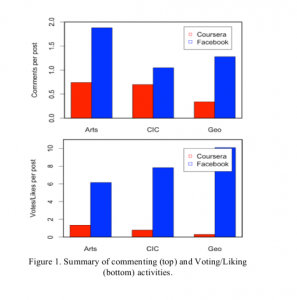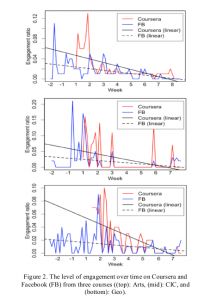“Higher education is just on the edge of the crevasse,” warned Harvard Business School Professor Clayton Christensen in 2013. Pointing to the rise of MOOCs, or Massive Online Open Courses, Christensen argued that the emerging popularity of online learning would disrupt the traditional model of classroom-based instruction. Christensen even claimed that the most established institutions would be forced to embrace a “hybrid model” of blended in-person/online education and integrate the use of MOOCs with their more specialized in-person offerings.
Yet just three years after Christensen’s sensational warnings, the pioneering spirit of democratized, open education has waned among its former believers. While some critics blame technical difficulties, copyright and intellectual property issues, or high drop out rates for the fading enthusiasm, others argue that MOOCs have yet to meet the inherent challenge of online learning. Unlike traditional classrooms, online academic experiences lack the personal interactions between professor and student and between peers that is crucial to creating a collaborative and engaging community of learning. In research investigating the social elements of online learning, educational technology specialists Whitney Kilgore and Patrick R Lowenthal argue that MOOC users often struggle with the individualistic experience of online learning: “Students regularly report feeling isolated and alone when taking online courses. This potential problem is amplified in MOOCs where there are hundreds, if not thousands, of learners,” Kilgore and Lowenthal conclude. As MOOC developers face declining interest in their products, they must address this social gap.
A recent study from Pennsylvania State University’s Saijing Zheng, Mary Beth Rosson, and John M. Carroll discusses one potential solution. Presented at the annual ACM Conference on Learning at Scale on April 26, 2016, “The Role of Social Media in MOOCs: How to Use Social Media to Enhance Student Retention” analyzes how MOOCs can utilize social media platforms such as Facebook to build community connections among online learners. Analyzing peer-to-peer interaction through the quantitative analysis of digital responses as well as a qualitative survey component among students and instructors, Zheng, Rosson and Carroll studied three MOOCs offered by Coursera. The researchers discovered that while more students were included in the Coursera-based discussion groups, the quality of interaction was much higher in the Facebook group created for course participants. Measuring the number of comments and likes/votes, the researchers concluded that students and professors were more likely to successfully find academic help and social interaction by posting or commenting in the Facebook group rather than in Coursera forums.
Students and professors participating in the study confirmed these data findings: “At the beginning of the course, I frequently asked questions on Coursera but [received] no answers. After a while, I chose to ask questions on Facebook and it worked. Actually, I like answering question on Facebook, as least I received some thanks and we can have real interactions,” reported one student, stressing that conversations on Facebook felt like a more authentic connection. Both students and professors noted that the anonymity of the Coursera forums could be problematic. Students admitted to using fake names, leading to a lack of accountability that contributed to a more negative community environment. “You cannot imagine how painful it was when I tried to look through the comments,” recalled one instructor. By forcing students to use their real names and pictures, the Facebook group for the courses fostered “very effective and meaningful discussions,” another instructor reported. Overall, participants in the Facebook group were much more likely to finish the course than participants in the Coursera forums.
The study from Zheng, Rosson, and Carroll highlights the potentially significant role of integrated social media into the MOOC experience. The successful utilization of social media as part of the online academic experience raises new questions among those invested in the success of MOOCs. Could live-tweeting classroom sessions similarly produce authentic peer-to-peer or student-to-instructor interactions? Could the features of sites such as Facebook be replicated within Coursera forums for more success in these spaces? If the use of social media can foster a sense of community comparable to traditional classroom environments, MOOC developers should take note — the MOOC revolution may depend on it.










Related Articles
No user responded in this post
Leave A Reply
Please Note: Comment moderation maybe active so there is no need to resubmit your comments